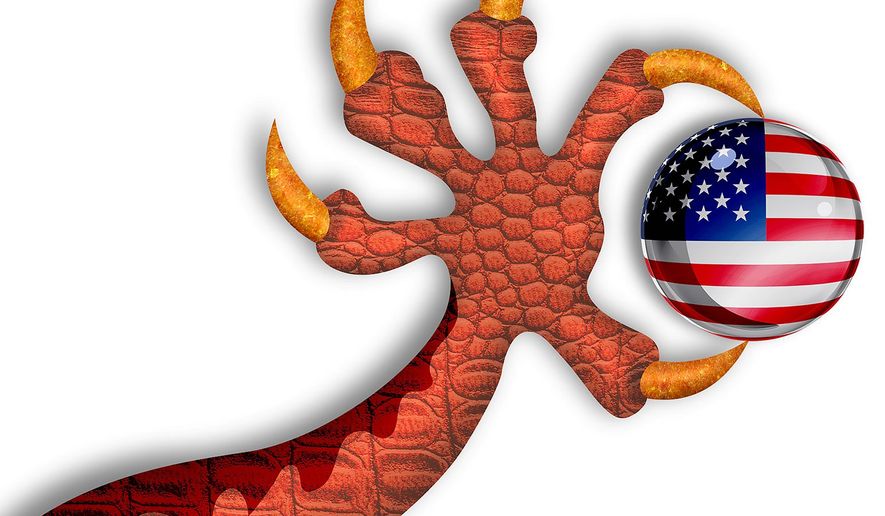OPINION:
Last week, presidential contender Joseph Biden asked rhetorically: “China is going to eat our lunch? Come on, man!” He added: “I mean, you know, they’re not bad folks. But guess what, they’re not competition for us!”
As vice president and, before that, as chairman of the Senate Foreign Relations Committee, Mr. Biden met foreign leaders and voted on foreign policy legislation. On that basis, he fancies himself a foreign policy expert. But at least where China is concerned, he has not kept up.
Evidence of China’s grand ambitions, hostile intentions and advancing capabilities has been mounting for years. Last week, the Pentagon issued a new report on Chinese military power. The People’s Liberation Army, it emphasized, is training “across all warfare domains” and preparing to fight “strong military opponents,” including those “beyond China’s periphery.” To whom do you suppose that might allude?
More specifically, China is developing the means “to degrade core U.S. operational and technological advantages.” China engages in extensive cyber espionage and wholesale cyber theft — hundreds of billions of dollars of intellectual property every year, including technologies it can’t invent, blueprints for U.S. weapons and control systems among them.
At a time when Americans are concerned — justifiably if belatedly — about Russian disinformation campaigns, China is conducting “influence operations against cultural institutions, media organizations, and the business, academic, and policy communities of the United States, other countries, and international institutions to achieve outcomes favorable to its security and military strategy objectives.”
China also uses “coercion and blackmail” to manipulate “Chinese citizens or ethnic Chinese citizens of other countries” to do their bidding.
The new report reinforces last year’s National Security Strategy (NSS) which identified China as the most significant long-term threat to the United States, with programs and plans “to erode American security and prosperity.”
China and Russia, the NSS concluded, “are determined to make economies less free and less fair, to grow their militaries, and to control information and data to repress their societies and expand their influence.”
The most recent National Defense Strategy (NDS), formulated while James Mattis — as independent and knowledgeable as they come — was serving as secretary of Defense, concluded that China is continuing “its economic and military ascendance, asserting power through an all-of-nation long-term strategy.” The goal: “Indo-Pacific regional hegemony in the near-term and displacement of the United States to achieve global preeminence in the future.”
One particularly threatening component of China’s strategy is cyber-enabled economic warfare (CEEW), a term coined by Samantha Ravich, my colleague at the Foundation for Defense of Democracies (FDD).
The term implies using cyber means to weaken or even cripple America’s economy as a way to diminish America’s military and political power. A recent FDD report concluded that Chinese government cyber warriors are “reversing many of the U.S. military’s technical and industrial advantages and creating potential vulnerabilities should a conflict arise.”
Imagine this scenario: A conflict breaks out between the United States and China over freedom of navigation in Asian international waters. Suddenly and mysteriously, America is hit by massive blackouts, and our electronic financial systems crash.
I could go on — China also is deploying weapons that can shoot down American communications satellites, and developing hypersonic glide missiles to deliver nuclear weapons — but I think you get the point. So why isn’t Mr. Biden aware of all this?
My guess is that he’s repeating what passed for conventional wisdom in the 20th century. In the early 1970s, when China was weak and Sino-Soviet relations tense, President Nixon pursued rapprochement with China’s rulers. Since then, of course, the Soviet Union has collapsed, and China’s economic and military power has grown at a pace few unanticipated.
Also, back in the day, it was widely and optimistically believed that expanding commercial ties with the U.S. and Europe would catalyze Chinese moderation and cooperation. Perhaps China could become our strategic partner.
Evidence to the contrary was mostly ignored. One example: In 1996, Lt. Gen. Mi Zhenyu said: “[As for the United States] for a relatively long time it will be absolutely necessary that we quietly nurse our sense of vengeance. We must conceal our abilities and bide our time.”
That quote can be found in “The Coming Conflict with China,” written in 1997 by Richard Bernstein and Ross H. Munro. Both had been correspondents in Beijing where their reporting and research led them to the conclusion that China was an “unsatisfied and ambitious power” that would inevitably clash with the United States.
As Mr. Bernstein recently recalled to me, almost all the China experts in academia and government, along with powerful leaders in the business community, denounced the book, and cast aspersions on the authors.
Failing to recognize that China is eager to “eat our lunch” is unlikely to damage Mr. Biden’s chances of winning the Democratic primary. Should he make it to the general election, however, being seen as a not-young candidate clinging to outdated thinking will not be helpful.
My gratuitous advice: He should peruse “The Hundred-Year Marathon: China’s Secret Strategy to Replace America as the Global Superpower” by Michael Pillsbury, a self-confessed former “panda-hugger,” who served in eight presidential administrations and is now the top China scholar at the Hudson Institute.
The title sums up Mr. Pillsbury’s thesis, but a line from “The Usual Suspects,” a 1995 movie, echoes a relevant subsidiary theme: “The greatest trick the Devil ever pulled was convincing the world he didn’t exist.”
• Clifford D. May is president of the Foundation for Defense of Democracies and a columnist for The Washington Times.




Please read our comment policy before commenting.